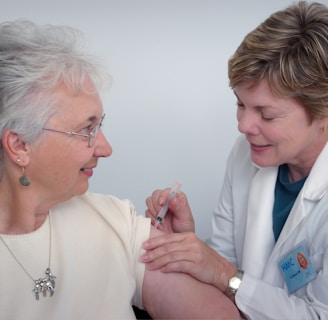The Critical Importance of English Language Proficiency for Nursing Professionals
Language proficiency is a critical skill for nursing professionals, enhancing communication, patient safety, and access to global opportunities. In an increasingly interconnected healthcare environment, nurses who invest in strong language skills—whether for local or international practice—are better prepared to deliver high-quality care, expand their impact, and build rewarding, future-ready careers.
4/18/20253 min read


Imagine this: In a hospital around the globe, a nurse stands frozen at a patient's bedside, vital medication in hand, as a critical instruction blares over the hospital PA system—in English. The patient's condition is deteriorating rapidly. Every second counts. But the language barrier creates a devastating hesitation that could mean the difference between life and death.
This scenario, playing out in hospitals across the globe, illuminates a stark reality: in today's healthcare environment, English language proficiency isn't just a credential on a resume—it's a clinical skill that can impact patient outcomes as directly as any medical procedure. For nursing professionals, mastering English has become as essential as understanding vital signs or administering medications.
In the high-stakes world of modern healthcare, where international mobility, evidence-based practice, and digital transformation intersect, English has emerged as the universal language of medicine. This article explores why investing in English language skills is not merely beneficial but absolutely crucial for nurses navigating the complex global landscape of 21st-century healthcare.
International Career Opportunities
For nursing professionals with aspirations to work abroad, English proficiency isn't just beneficial—it's mandatory. Countries like the USA, UK, Australia, Canada, and many Middle Eastern nations actively recruit international nurses but require demonstrated English language competency through standardized tests such as:
IELTS (International English Language Testing System)
OET (Occupational English Test)
TOEFL (Test of English as a Foreign Language)
These examinations assess listening, reading, writing, and speaking skills within healthcare contexts. Strong English language skills not only help in passing these assessments but also ease the transition to living and working in a new country, handling workplace communication, and adapting to different healthcare systems.
Clinical Documentation and Patient Notes
Accurate and clear clinical documentation is fundamental to quality healthcare delivery. In most hospitals and healthcare facilities worldwide, including many in non-English speaking countries, medical records are maintained in English. Nurses must be proficient in:
Writing clear and concise patient notes
Documenting medications and treatments accurately
Recording vital signs and observations
Communicating patient status during handovers
Completing incident reports with precision
Errors in documentation due to language barriers can lead to serious consequences for patient safety and care continuity.
Access to Medical Knowledge and Resources
The vast majority of medical literature, research papers, textbooks, and online resources are published in English. For nursing professionals seeking to:
Stay updated with the latest evidence-based practices
Access continuing education materials
Understand new treatment protocols
Follow medical technology advancements
English proficiency provides direct access to this knowledge without relying on translations, which may be delayed or unavailable for cutting-edge information.
Interdisciplinary Communication
Modern healthcare delivery relies on effective interdisciplinary teamwork. Nurses regularly interact with:
Physicians from various specialties
Allied health professionals
Healthcare administrators
International colleagues and consultants
In multinational teams or international healthcare settings, English often serves as the common language for these interactions. Strong English skills ensure nurses can actively participate in care discussions, understand instructions clearly, and contribute their crucial patient insights.
Professional Development and Advanced Education
Career advancement in nursing frequently requires further education and specialization. Many prestigious nursing programs, conferences, and certification courses are conducted in English. Proficiency in the language allows nurses to:
Pursue advanced degrees in specialties like critical care, oncology, or nurse anesthesia
Present research findings at international conferences
Participate in global nursing forums and webinars
Network with professionals across borders
Patient-Centered Care in Diverse Settings
Even within non-English speaking countries, nurses increasingly encounter English-speaking patients, including:
International patients seeking medical tourism services
Expatriate communities
Business travelers and tourists requiring medical attention
The ability to communicate effectively with these patients improves care quality, reduces anxiety, and helps establish trust—essential elements of patient-centered care.
Digital Health Technology
The rapid digitalization of healthcare has introduced numerous technologies with English-language interfaces. Electronic health records, monitoring equipment, telehealth platforms, and medical applications often operate in English by default. Proficient English skills help nurses navigate these systems effectively and take advantage of digital tools that enhance patient care.
Research Participation and Contribution
Nurses with strong English skills can more actively participate in and contribute to global healthcare research. This includes:
Understanding research protocols and methodologies
Collecting and documenting data accurately
Collaborating with international research teams
Publishing findings in reputable journals
Translating research into clinical practice
As the nursing profession continues to emphasize evidence-based practice, the ability to engage with research becomes increasingly valuable.
Conclusion
For nursing professionals, English language proficiency represents far more than a desirable skill—it's a career-defining competency that impacts every aspect of professional practice. From providing safe, effective patient care to accessing global opportunities for advancement, strong English skills provide nurses with the tools they need to thrive in the modern healthcare environment.
Whether planning to work abroad or remain in their home country, nurses who invest in developing their English language abilities position themselves for greater success, broader impact, and more fulfilling careers in the ever-evolving field of healthcare.
New Teaching Point
Unlock your potential with personalized coaching today.
CoNTACT
8890427222
© 2024. All rights reserved.
Links
